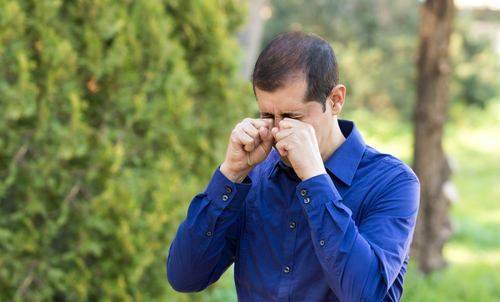The Disadvantages Of Dry Eye During Allergy Season

If you suffer from chronic dry eyes year-round, then you dread spring and seasonal allergies. It is the harshest time of year for you if you have chronic dry eyes.
But can you tell if you have irritated eyes from pollen, dry air, or something else? It can be challenging to determine what is drying your eyes out.
Whatever the reason, having dry eyes during allergy season can be very unpleasant. But there are some options to help relieve your discomfort.
Keep reading to learn more about dry eyes and keeping yours hydrated and comfortable.
What Is Causing Your Dry Eye?
When you have dry eyes in the spring, it may be hard to tell if it’s because of allergies or a more severe condition. Your eyes can become dry when they don’t produce enough quality tears. They can also be dry even if they make a lot of tears.
Some common causes for dry eyes include certain medications, age, and environmental factors. All of these scenarios are normal.
However, you could have a more serious problem if your eyes regularly do not produce enough tears or over-produce tears but are always dry. If either of these is true for you, then you could have dry eye syndrome.
What is Dry Eye Syndrome?
Dry eye syndrome is a widespread condition that causes your eyes to be dry and irritated most of the time. It occurs when you have a problem in your tear glands or tear ducts that disrupts tear production.
There are two common ways dry eye syndrome manifests. One is not producing enough tears, and the other is low-quality tears.
Low-quality tears lack one or more of the main ingredients of tears: mucus, oil, and water.
If any of these ingredients are missing or low, then your tears are of poor quality. Low-quality tears cannot thoroughly coat your eyes to keep them hydrated and supplied with the nutrients they need.
Often these inadequate tears evaporate too quickly, which is how your eyes can constantly run but always be dry. Rapid evaporation happens because they lack the nutrients to coat your eye.
Some other symptoms of dry eye syndrome are:
- Red, inflamed eyes
- Blurry vision
- Eye pain
- Burning sensation in your eyes
- Difficulty wearing contact lenses
Why Are My Symptoms Worse During Allergy Season?
There are two reasons why your eyes become more irritated during allergy season. First, your eyes can become inflamed because of allergens like pollen. And second, using antihistamines to combat allergy symptoms can make eyes drier.
Dry eye syndrome plus antihistamines can be an unpleasant combination. It is a twofold irritant. What you are using to reduce your allergies is amplifying your dry eye syndrome.
You may find yourself rubbing your eyes, hoping to gain some relief. Do not do this! Don’t ever rub your eyes, no matter what.
It can be incredibly damaging to them. And, it will leave your eyes red and swollen, the opposite of what you hope it will do.
Some Help For Seasonal Dry Eyes
Fortunately, there are remedies you can use right now to relieve your eyes. Here are some simple but effective treatments to reduce your dry eye discomfort:
- Place a cool compress over your eyelids
- Use an air purifier inside to remove allergens from the air.
- Drink plenty of water to keep your body hydrated
- Never rub your eyes.
- Blink frequently to stimulate tear production.
- Use lubricating eye drops.
- Use a humidifier inside to get more moisture in the air.
- Talk to your doctor about changing any medications that may cause dry eyes.
- Eat more Omega-3 fatty acids.
Are you tired of relentless dry eyes? Schedule an appointment at Pinke Eye Center in Shelton, CT, to discuss further treatment for your dry eyes.


